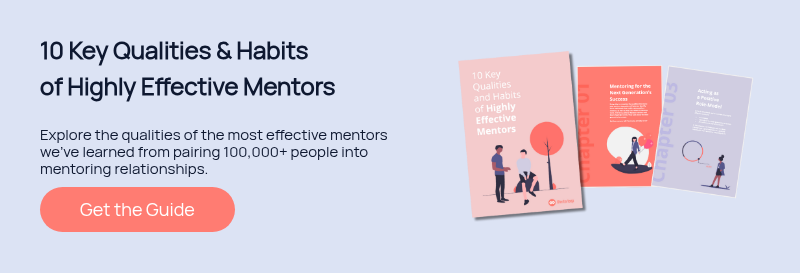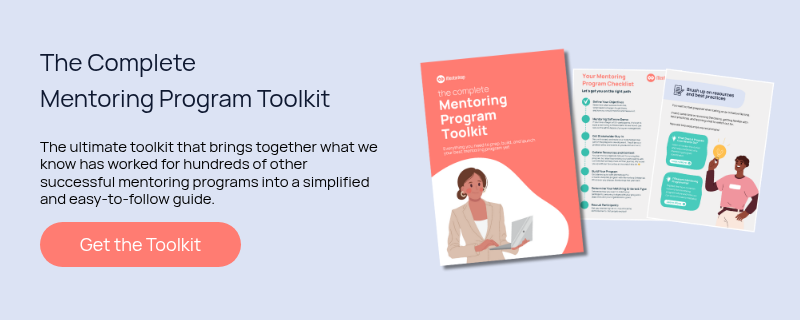It’s common to struggle to find questions to ask your mentor or mentee. Getting to know your mentoring partner can feel awkward or even vulnerable – but this is normal. Building rapport with your mentoring partner and creating a space of psychological safety is key.
So before we go into what questions to ask your mentor or mentee, let’s hear from Janet Phan as she describes how she has navigated that journey herself:
So if you’re feeling stuck, we’ve crafted this list of engaging questions sure to spark conversation with your mentor or mentee, help you go deeper, and add some extra structure to your meetings to ensure you get the most out of them.
But first, if you’re a mentee, we want to make sure you’ve had a chance to look at and work through this first meeting checklist. It will help you better understand your mentor – their background, experience, and what they’re bringing to the table. It will also help you better articulate your goals for the mentorship and help you both give and receive feedback.
If you have completed this checklist, why not check out these four mentoring session guides? They can further help you construct your sessions to pack more of a punch. Whether you choose the Storyteller, Guru, Situation, or Skill-Builder session guide, you’ll get to know your mentoring partner in a new light with each one.
Once you’ve worked through those, you’ll still need some questions for further down the relationship. So without further ado, here is a list of mentorship questions to ask your mentoring partner.
73 Mentorship Questions
We’ll first look at good questions to ask a mentor, then questions for a mentor to ask mentees.
Questions to Ask Your Mentor
When meeting with your mentor, it’s important to come prepared with questions. This will show them that you are serious about the mentorship process and are committed to making the most out of it. Questions to ask your mentor include:
- What can I do to maximize my progress during this mentorship?
- What do you think I should prioritize when it comes to my goals?
- What methods do you use when dealing with difficult situations?
- What is the best way to communicate with you?
Need to break the ice first?
Here are some fun, quirky questions to break the ice and get to know a different side of your mentor, one that might not be immediately apparent in his or her professional persona.
- If you could be an animal, what would you be and why?
- What would the title of your autobiography be?
- What was your favourite toy as a child?
- What’s an activity you did a lot when you were a child that you wish you could do more of now?
- Do you remember one of the first things (a pet, toy, etc.) you named? Why did you name it that?
- If you could curate a museum gallery, what would you put in it?
- What TV or movie character is most like you, and why?
- If you could combine any two animals, what would they be? What would you call this new animal?
Once you’ve had some fun with these questions (some responses can be quite telling!), it’s time to get a little more insight.
Dive into your mentor's professional past
- What was your first-ever job? What did you love and hate about it?
- Did you think you’d find yourself in this industry? If so, when did you know this was the work you’d go into? If not, how did you get here?
- What would be your dream job?
- How do you make yourself happy in your current role/industry?
- What’s something you’d like to change about your current role/industry?
- Did you have a mentor at some point in your career? If so, how did s/he help you? If not, why did you never seek one out?
Questions for Mentors to Ask Mentees
Now it’s time to flip the script! Mentors, here are some questions you can ask your mentee on both the personal and professional front to better understand them and why they’re interested in this mentoring partnership.
Asking your mentee questions will help you to understand their needs and motivations, and develop more effective ways to support them.
Common questions to ask your mentee include:
- What drew you to this opportunity?
- What do you hope to achieve through our mentorship?
- What do you consider your strengths and weaknesses?
- What methods do you use when dealing with difficult situations?
- How do you like to receive feedback?
Next, we’ll dig into the professional side of things a bit more.
Exploring your mentee's experience
- Who do you talk with about the struggles and successes of your job?
- In your current role, have you ever thought about quitting? Why?
- Do you feel you are a part of a community, either in or outside of work? Who makes up that community and how do you support one another?
- If you could learn any new professional skill (it doesn’t have to be related to your current role or industry), what would it be?
- Where do you ultimately want to end up in your career (role, title, income, etc.)?
Need to get to know your mentee more?
- What was your favourite gift you received from the Tooth Fairy?
- If you could learn to play any instrument, what would it be?
- Who’s your favourite person (friend, family member, etc.)?
- What’s something silly that made you angry as a kid?
- What superhero do you resonate with the most? Why?
- If you could have the life of any famous artist or musician (dead or living), whose would you choose?
Explore Our Mentoring Session Guides
Still stuck? Go ahead and explore our four types of mentoring sessions. Approaching your mentoring catch-ups in a variety of ways assists in building rapport, exploring new areas and reflecting on your own experiences while learning about others’ experiences too.
Let’s also dive into a few more ways to strengthen a quality mentoring relationship along with some tips and questions to ask yourself.
How to Foster a Positive Mentoring Relationship
Once you have established your mentorship relationship, it’s important to maintain it. This means establishing an open line of communication, setting clear goals and expectations, and encouraging open dialogue. It’s also important to establish trust, constructively provide feedback, and be consistent in your approach.
Questions to ask yourself include:
- What methods can I use to ensure effective communication?
- How can I make sure that our relationship is built on trust?
- How can I ensure that my advice is constructive and helpful?
Benefits of Establishing a Mentorship Relationship
Establishing a mentorship relationship can be beneficial for both parties involved. Mentors gain the satisfaction of providing guidance and helping someone reach their goals, while mentees get the benefit of gaining valuable knowledge and insight from someone who has experience in their field.
Questions to ask yourself include:
- What motivates me as a mentor?
- What do I hope to gain from this relationship?
- What are some potential obstacles I may have to overcome?
Tips for Effective Mentoring
Mentoring isn’t always easy – it requires patience, understanding and guidance. Here are some quick tips for effective mentoring: Listen attentively, provide honest feedback and constructive criticism, be patient and understanding, set clear goals and expectations, provide resources and advice, encourage open dialogue, and celebrate successes.
Questions to ask yourself include:
- How can I ensure that I am providing effective guidance?
- What methods can I use to ensure that our conversations are productive?
- How can I make sure that my advice is helpful?
Best Practices for Connecting With Your Mentor or Mentee
Establishing a connection with your mentor or mentee is key to having a successful mentorship relationship. Best practices for connecting with your partner include: regularly setting up meetings for discussion, being open and honest about your expectations and goals, creating an environment of mutual respect, listening attentively and providing honest feedback, being consistent with your approach, and showing appreciation for your partner’s efforts.
Questions to ask yourself include:
- How can I ensure that our relationship is based on mutual respect?
- How can I make sure that our conversations are productive?
- What methods can I use to show appreciation for my partner’s efforts?
How to Make the Most of Your Mentorship Experience
Making the most of your mentorship experience requires effort from both parties. Here are some tips for making the most of it: Set realistic goals, be open and honest about expectations and challenges, be consistent in your approach, provide constructive feedback, listen attentively and give honest advice, maintain an open line of communication, and encourage open dialogue.
Questions to ask yourself include:
- What methods can I use to ensure that our conversations are productive?
- How can I make sure that my advice is helpful?
- How can I ensure that our relationship is based on trust?
Challenges of Being a Mentor or a Mentee
Being a mentor or a mentee comes with its own set of challenges. As a mentor, you may find yourself having difficulty providing guidance or advice in certain situations. As a mentee, you may find it challenging to stay motivated or keep up with the expectations of your mentor.
Questions to ask yourself include:
- What are some potential obstacles I may have to overcome as a mentor or a mentee?
- How can I ensure that our conversations stay productive?
- How can I make sure that our relationship is built on trust?
Building Trust in the Mentoring Relationship
Building trust between both parties is essential for a successful mentorship relationship. This requires open communication, setting clear expectations and goals, consistency in your approach, providing feedback in a constructive way, listening attentively and providing honest advice.
Questions to ask yourself include:
- How can I ensure that my advice is helpful?
- How can I make sure that our conversations stay productive?
- What methods can I use to build trust between myself and my partner?
Setting Goals and Expectations in the Mentorship
Setting clear goals and expectations from the beginning is essential for a successful mentorship relationship. This involves discussing what each party hopes to gain from the experience, setting objectives that both parties agree on, and establishing deadlines for achieving these objectives.
Questions to ask yourself include:
- What kind of goals should we set for this mentorship experience?
- How often should we review our progress?
- How can we ensure that we are both working towards the same objectives?
Encouraging Open Communication in the Mentorship
Encouraging open communication is important in any relationship. In a mentorship relationship, this means establishing an open line of communication between mentor and mentee, being honest about expectations and challenges, listening attentively and providing honest feedback, being consistent with your approach, and thanking each other for their efforts.
Questions to ask yourself include:
- What methods can I use to ensure effective communication?
- How can I make sure that our conversations stay productive?
- What methods can I use to show appreciation for my partner’s efforts?
Dealing With Difficult Situations in the Mentorship
Dealing with difficult situations in a mentorship relationship requires patience, understanding and guidance. It’s important for both parties to remain calm and be open about their concerns or disagreements. It’s also important for both parties to remain respectful of each other’s views and provide constructive feedback.
Questions to ask yourself include:
- How can I make sure that our conversations remain productive?
- How can I ensure that my advice is helpful?
- What methods can I use to foster an environment of mutual respect?
Strategies for Maintaining an Effective and Productive Mentorship
Maintaining an effective and productive mentorship requires effort from both parties. Strategies for doing so include: Establishing an open line of communication, setting clear goals and expectations, listening attentively and providing honest feedback, being consistent with your approach, providing constructive criticism when necessary, celebrating successes, and showing appreciation for each other’s efforts.
Questions to ask yourself include:
- What methods can I use to ensure effective communication?
- How can I make sure that our conversations remain productive?
- What methods can I use to show appreciation for my partner’s efforts?
How to Evaluate the Success of Your Mentorship
Evaluating the success of your mentorship is essential in order to ensure that both parties are getting the most out of it. Evaluation should involve tracking progress towards goals, reflecting on successes and areas of improvement, finding ways to overcome any challenges, providing honest feedback and support, and celebrating accomplishments together.
Questions to ask yourself include:
- How often should we review our progress towards our goals?
- What methods can I use to provide constructive feedback and support?
- How can I ensure that our conversations remain productive?
Ways to Celebrate Milestones in the Mentorship
Celebrating milestones in a mentorship relationship is an important way of showing appreciation for each other’s efforts. This could involve treating each other out for lunch or dinner, taking time out together for an activity such as bowling or miniature golfing, or sending each other cards or gifts as tokens of gratitude.
Questions to ask yourself include:
- How often should we celebrate milestones together?
- What activities could we do together as a way of celebrating our successes?
- How can I show my appreciation for my partner’s efforts?
What Not To Do When Establishing a Mentoring Relationship
When establishing a mentorship relationship it’s important not only to know what you should do but also what not do.
Things not to so likely include:
- Making assumptions about your partner’s abilities or expectations without discussing them first
- Imposing your own expectations on your partner
- Avoiding difficult discussions
- Taking criticism personally
- Not setting clear boundaries
- Not making an effort towards maintaining open communication
- Not listening attentively
- Not showing appreciation for your partner’s efforts
- Failing to celebrate successes together
- Being inconsistent with your approach
- Not providing constructive criticism when necessary
- Setting unrealistic goals
- Not making an effort towards fostering an environment of mutual respect
Ideas for Activities That Can Enhance the Quality of Your Conversations
Enhancing the quality of conversations between mentor and mentee requires effort from both parties.
Ideas for activities that could help include:
- Reading books or articles related to your field together
- Role-playing different scenarios related to the topics discussed
- Participating in webinars or workshops related to your field
- Creating an agenda prior to each meeting covering specific topics or questions
- Brainstorming potential solutions together
- Taking time out each week specifically dedicated towards talking about challenges or successes
For more insight into how you can make your mentoring relationships fruitful, check out the stories from the mentors and mentees in Mentorloop-powered mentoring programs:
Wrapping Up
It’s not uncommon for both mentors and mentees to be unsure if they’re a good match or not. That’s because it’s normal to get stuck getting to know a mentoring partner.
We understand that building rapport is the best way to get the most out of your mentorship experience. Hopefully, these quirky and digging mentorship questions will help you get to know your mentor or mentee on a more personal level and provide more common ground.
Got a few more questions up your sleeve that we should add? Let us know!
If you’re ready to create a culture of intentional mentoring at your organisation, Mentorloop can help. We’ll get you started by building a custom mentoring program for your business, with guidance on how to get the most out of it, step-by-step.
Now’s the time to harness the power of mentoring and put it to work for your organisation. Build your Mentorloop-powered mentoring program today!






